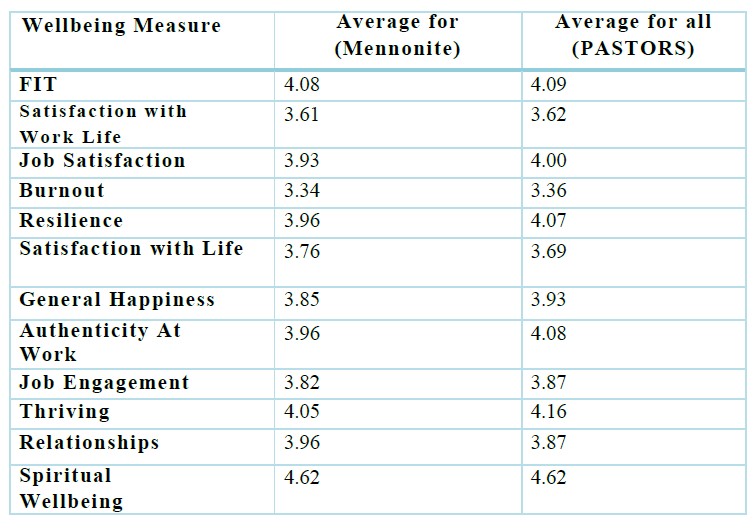
Terry Shue is director of Leadership Development for Mennonite Church USA.
“Being a pastor is a tough, demanding job, one that is not always very well understood or appreciated. Pastoral work is more complex than that which transpires in the hour-or-so a week that many lay people see the pastor in action as she or he leads worship and preaches. What happens during this time is surely of central importance to clergy and their parishioners, but it is not the only important thing clergy do… it is a job in flux … it is made increasingly difficult by rapid changes in the pastor’s work environment, including the broader culture in which pastoral work is done.” — Matt Bloom, professor and researcher at University of Notre Dame (and a pastor’s spouse)
This past spring, credentialed persons of MC USA were invited to take part in a survey for “Flourishing in Ministry,” a study being conducted out of University of Notre Dame which includes numerous denominations.
This study seeks to understand the wellbeing of pastors and to work with them to raise the collective components (everyday happiness, self integrity, resilience and thriving) which together equate to wellbeing. For more on this check out the website here. It is important to know that even if you did not participate in the study by filling out the survey, you can still complete the survey to assess your personal wellbeing and chart your status here. Then click “Join our Study,” insert your preferred email and make sure to use the referral code “Mennonite” to take your own survey.
Though we fell a few short of the numbers of pastors needed to provide a verifiably statistical report, a report was provided which and is available upon request. This 94-page document details the responses from MC USA pastors and allows anyone who took or takes the survey to compare their results with those of their Mennonite peers as well as pastors of all other denominations that have previously participated.
To give a bit of a snapshot, I will include just a few points of summary here. Below is a graph showing where MC USA pastors place themselves compared to the composite of all other pastors in the study. If nothing else this study removes from us any illusions of being special. Indeed from what this shows statistically, we are extremely normal!

WELLBEING MEASURE AVERAGES
A score 3 or lower is of concern – action should be considered.
A score above 3 – 4 is moderate.
A score above 4 is good and considered flourishing
I also have provided the five recurring themes the researchers have pulled out from MC USA pastor data which, from their perspective, have emerged as significant. For the researchers in our midst, the report here uses the pure, objective, grounded theory approach to analyzing the responses. Though these results are not a big surprise, we would do well to reflect on them at many levels in our church, personally, in our congregationally, conference-wide and at the seminary level. Here they are as presented by the researchers:
THEME 1: Financial Strains
Many pastors who responded to the survey reported having suffered from financial strain or stress. This is often due to already existent financial stresses on the church as a whole and is considered a problem by pastors only in so much as it prevents them from fulfilling their calling to the fullest.
THEME 2: Relationships
The well-being of a pastor’s partner, children and extended family seem to have a high correlative relationship with that of the pastor himself/herself. Stresses on these relationships can usually be attributed to three factors: health, finances and work/life balance.
THEME 3: Calling
We have seen that all ministers feel “called” to their work in some way or another. Ministry is a vocation in the truest sense of the word. However, events often take place that cause pastors to question their calling and whether they want to continue their work. This seems to be a natural, but temporary phase of thought in ministry work.
THEME 4: Congregation
The nature of a minister’s congregation plays a huge role in his or her sense of enjoyment, success and potency. When a pastor has a good, strong relationship with his/her congregation, s/he feels a higher sense of job satisfaction than if s/he’s struggling to connect or provide for the congregation.
THEME 5: Part-time or Bi-Vocational
Many pastors who responded to the survey are bi-vocational with at least part-time, but oftentimes full-time, secular careers. While this in itself is not a problem, many pastors are forced to have two “careers” because they need to financially support their families.
THEME 6: Stress and Mental Health
While mental health issues (e.g., depression, loneliness, isolation) do not apply to all pastors, we noted a recurring theme that the life of a pastor is difficult, and it feels that there is sometimes nowhere to turn.
As you read through these themes, which ones do you feel the emotional weight of? Which ones jeopardize your continued call to ministry? Or that of your peers?
If you have not yet taken the survey, I encourage you to do so, as part of your own self-care and in the best interest in the church you serve. Over the coming months we will find multiple ways to engage in these learnings and to continue to find ways to increase the wellbeing of all of the pastors in our system.

